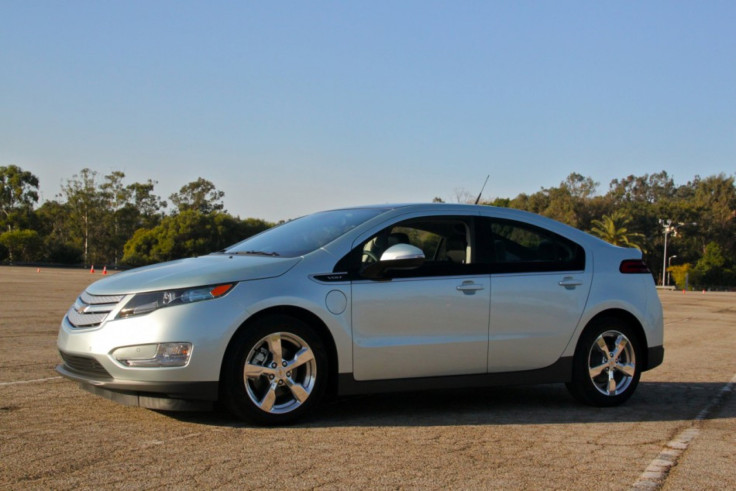GM Chevy Volt Fiasco: Are Electric Cars Safe?

At a time when electric cars are beginning to steal the limelight from their gas-eating rivals, a new finding from the National Highway Traffic Safety Administration (NHTSA) over General Motors' (NYSE:GM) electric vehicle, Chevrolet Volt, may likely question the safety of electric cars.
The NHTSA is probing the risk of fire in the Chevy Volts, after a fire sparked out of the electric car in one of the crash tests conducted by the agency. During that test, the vehicle's lithium-ion battery was damaged and the coolant line was ruptured. The fire involving the test vehicle occurred more than three weeks after it was crashed, leading the agency to conclude that the damage to the vehicle's lithium-ion battery during the crash test led to the fire.
While, the NHTSA is not aware of any roadway crashes that have resulted in battery-related fires in Chevy Volts or other vehicles powered by lithium-ion batteries, the fact that damage from three tests explicitly designed to replicate real-world scenarios did result in one, they believe, is cause for concern.
In further testing, carried out by the NHTSA in November, two of the three tests resulted in thermal events, including fire. The NHTSA, therefore, opened a formal safety defect investigation on Nov. 25, to examine the potential risks involved from intrusion damage to the battery in the Chevrolet Volt.
Chevy Volt owners whose vehicles have not been in a serious crash do not have reason for concern.
In the meantime, the agency is continuing to work with all vehicle manufacturers to ensure they have appropriate post-crash protocols and asked automakers who currently have electric vehicles in the market or plan to introduce electric vehicles in the near future to provide guidance for discharging and handling their batteries for managing fire risks.
While it is too soon to tell whether the investigation will lead to a recall of any vehicles or parts, if the NHTSA identifies an unreasonable risk to safety, the agency will take immediate action to notify consumers and ensure that GM communicates with current vehicle owners.
GM, on its part, said the fire could have been avoided if its protocols for deactivating the battery after the crash had been followed and also stated that they are working with other vehicle manufacturers, first responders, tow truck operators and salvage associations with the goal of implementing industry wide protocol.
A statement released by the company said that as it attempts to introduce technology leading toward a replacement, it continues to make reassuring statements that the OnStar equipped and highly engineered Volt is very safe.
Although the Volt is being singled out, the NHTSA has advised drivers and others who might be involved with any crashed electric vehicle to follow the below procedures:
* Consumers are advised to take the same actions they would in a crash involving a gasoline-powered vehicle; i.e., exit the vehicle safely or await the assistance of an emergency responder if they are unable to get out on their own, move a safe distance away from the vehicle and notify the authorities of the crash.
* Emergency responders should check a vehicle for markings or other indications that it is electric-powered. If it is, they should exercise caution, per published guidelines, to avoid any possible electrical shock and should disconnect the battery from the vehicle circuits if possible.
The Chevy Volt battery issue comes at a time when lot of forthcoming electric cars plan to use the lithium-ion battery. Incidentally, batteries of the same kind caused PC makers such as Apple Inc. (NASDAQ: AAPL) and Dell Inc. (NASDAQ:DELL) to recall millions of laptops over similar dangers of combustion. Meanwhile, Ford and Nissan have already released their electric car variants, while other firms such as Tesla are selling their electric cars.
Meanwhile, electrics cars could change the face of the auto industry worldwide, as they reduce carbon emissions, pave way for decreased oil-dependence and save money for consumers amid rising oil prices. U.S. President Barack Obama has called for at least a million electric vehicles on the road by 2025.
Chevrolet Volt, which has been on sale in the U.S. market since mid-December 2010, is a four-seater that runs on both electricity as well as gas. The vehicle runs on an electric charge for up to 40 miles and from then on the gas-powered engine comes on, to generate electricity and provide another 300 miles, on a full tank. Chevrolet said it will produce 10,000 Volts by the end of 2011 and an additional 30,000 in 2012.
The suggested retail price for the 2011 Chevrolet Volt in the U.S. starts at $40,280, before the $7,500 U.S. federal tax credit and additional incentives available in some locations. The 2012 Volt base price will be $1,005 less than the 2011 model, as the base configuration has been de-featured. The 2011 Volt is being sold only in selected U.S. markets and nationwide availability of the 2012 model year is expected by Nov. 2011.
© Copyright IBTimes 2025. All rights reserved.





















